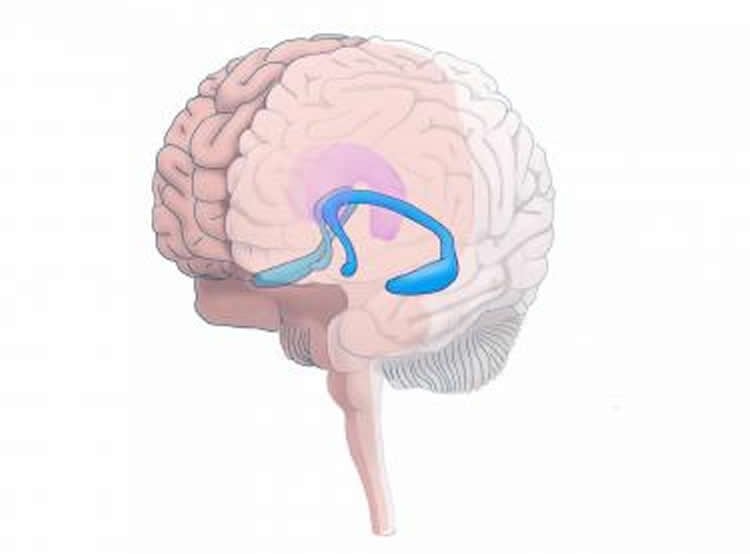Summary: Larger hippocampal volume in combination with how safe teens feel in their community environments contribute to how depressed they feel, a new study reports.
Source: UC Davis.
Research on depression in adolescents in recent years has focused on how the physical brain and social experiences interact. A new University of California, Davis, study, however, shows that adolescents with large hippocampal volume were more, or less, susceptible to feelings of depression depending on how unsafe — or conversely — protected they felt in their home and community environments.
Hippocampal volume refers to the overall size of the hippocampus, a brain structure below the cerebral cortex. Traditionally, research has shown that a smaller hippocampus is implicated in depression, but this study showed that a larger hippocampus may indicate a greater ability for adolescents to take advantage of the support in their environments and overcome fear, anxiety and depression.
“As adolescents with more severe depressive symptoms are at greater risk of developing clinically diagnosed depressive disorders in adolescence and beyond, our results have important implications for prevention and intervention strategies. With this knowledge, we can better prevent and treat depressive symptoms in the teen years,” said Amanda Guyer, professor of human development and family studies with the UC Davis Center for Mind and Brain. She is a co-author of the study.
The study also pointed out that as neuroimaging becomes more feasible in diagnosis, the findings could prove helpful in identifying individuals’ risk for depression early on.

The research represents a significant step forward to better understanding the complex interactive role of biological and environmental factors in both risk and resilience to depressive symptoms, the study found.
The study looked at 209 youths, conducting scans of their brains in 11th or 12th grades. Researchers monitored youth for self-reported depression symptoms, looking at students’ exposure to family connectedness — centered inside the home. Researchers also monitored youths’ exposure to issues outside their home, such as crime in their community.
The teens involved in the study were of Mexican origin, a group which is a group at heightened risk for depression, the authors state.
Funding: This research was supported by the National Institutes of Health; William T. Grant Foundation; National Science Foundation; UC Davis, including the Center for Poverty Research; and U.S. Department of Health and Human Services, Office of the Assistant Secretary for Planning and Analysis.
Co-authors are Roberta A. Schriber, Zainab Anbari, Center for Mind and Brain; Richard W. Robins, psychology; Rand D. Conger, human ecology; Paul D. Hastings, psychology and Center for Mind and Brain; and Amanda E. Guyer, Center for Mind and Brain, and human ecology.
Source: Karen Nikos-Rose – UC Davis
Image Source: NeuroscienceNews.com image is credited to Jay Leek.
Original Research: Abstract for “Hippocampal Volume as an Amplifier of the Effect of Social Context on Adolescent Depression” by Roberta A. Schriber, Zainab Anbari, Richard W. Robins, Rand D. Conger, Paul D. Hastings, Amanda E. Guyer in Clinical Psychological Science. Published online May 13 2017 doi:10.1177/2167702617699277
[cbtabs][cbtab title=”MLA”]UC Davis “Social Environment and Hippocampal Volume Affect Adolescent Depression.” NeuroscienceNews. NeuroscienceNews, 17 May 2017.
<https://neurosciencenews.com/environment-hippocampus-depression-6710/>.[/cbtab][cbtab title=”APA”]UC Davis (2017, May 17). Social Environment and Hippocampal Volume Affect Adolescent Depression. NeuroscienceNew. Retrieved May 17, 2017 from https://neurosciencenews.com/environment-hippocampus-depression-6710/[/cbtab][cbtab title=”Chicago”]UC Davis “Social Environment and Hippocampal Volume Affect Adolescent Depression.” https://neurosciencenews.com/environment-hippocampus-depression-6710/ (accessed May 17, 2017).[/cbtab][/cbtabs]
Abstract
Hippocampal Volume as an Amplifier of the Effect of Social Context on Adolescent Depression
Recent models have focused on how brain-based individual differences in social sensitivity shape affective development in adolescence, when rates of depression escalate. Given the importance of the hippocampus in binding contextual and affective elements of experience, as well as its putative role in depression, we examined hippocampal volume as a moderator of the effects of social context on depressive symptoms in a sample of 209 Mexican-origin adolescents. Adolescents with larger versus smaller hippocampal volumes showed heightened sensitivity in their depressive symptoms to a protective factor inside the home (sense of family connectedness) and a risk factor outside the home (community crime exposure). These interactive effects uniquely predicted depressive symptoms and were greater for the left side, suggesting two independent social-contextual contributions to depression that were moderated by left hippocampal volume. Results elucidate complex brain-environment interplay in adolescent depression, offering clues about for whom and how social context plays a role.
“Hippocampal Volume as an Amplifier of the Effect of Social Context on Adolescent Depression” by Roberta A. Schriber, Zainab Anbari, Richard W. Robins, Rand D. Conger, Paul D. Hastings, Amanda E. Guyer in Clinical Psychological Science. Published online May 13 2017 doi:10.1177/2167702617699277






